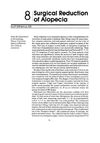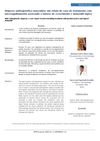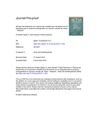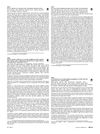6 citations,
April 2020 in “Cureus” Platelet-rich plasma injections can effectively treat alopecia areata barbae.
3 citations,
July 2001 in “PubMed” Finasteride helps manage male hair loss, but realistic expectations and support are crucial.
Certain genes may influence hair loss differently in men and women.
 February 2024 in “ACS Omega”
February 2024 in “ACS Omega” The Shen Bai Hair Growing Decoction may help treat hair loss by promoting hair growth and reducing inflammation.
 September 2023 in “Medicine”
September 2023 in “Medicine” Herbal extract spray improved hair growth in a man with hair loss.
 September 2023 in “Biomedical Optics Express”
September 2023 in “Biomedical Optics Express” New imaging techniques show testosterone delays hair growth and shrinks follicles in mice, but have limited depth for viewing.
 June 2023 in “Journal of Cosmetic Dermatology”
June 2023 in “Journal of Cosmetic Dermatology” The new follicular unit extraction treatment effectively treats severe hair loss in Asian men, giving natural-looking results with few side effects.
 January 2023 in “International Journal of Medicine in Developing Countries”
January 2023 in “International Journal of Medicine in Developing Countries” Topical minoxidil improved hair loss in a patient when used consistently.
 October 1987 in “Clinics in Dermatology”
October 1987 in “Clinics in Dermatology” Scalp reduction can improve hair distribution in certain baldness cases but requires careful patient selection and understanding of facial structure.
PRP treatment mildly to moderately improves hair loss in most men with AGA.
10 citations,
January 2021 in “Annals of dermatology/Annals of Dermatology” Nivolumab can cause hair loss as a rare side effect.
 6 citations,
April 2014 in “PubMed”
6 citations,
April 2014 in “PubMed” A man got brown patches on his skin (melasma) after taking finasteride, a hair loss treatment.
1 citations,
January 2017 in “International journal of trichology” Diphenylcyclopropenone (DPCP) effectively treated both alopecia areata and verruca vulgaris.
July 2024 in “Actas Dermo-Sifiliográficas” Finasteride and dutasteride do not significantly change beard thickness in men.
May 2021 in “F1000Research” The treatment led to denser, thicker hair growth and less hair loss.
30 citations,
January 2019 in “International Journal of Trichology” Androgenetic alopecia significantly harms quality of life, affecting emotions and relationships.
 February 2024 in “The Journal of Sexual Medicine”
February 2024 in “The Journal of Sexual Medicine” 5-α reductase inhibitors do not significantly affect male reproductive function but may reduce semen volume.
 October 2023 in “Toxicology and Applied Pharmacology”
October 2023 in “Toxicology and Applied Pharmacology” Finasteride is more harmful to male reproductive health than minoxidil.

Micro-needling with growth factors and minoxidil improved hair growth in a balding man.
 18 citations,
August 2019 in “Drug Development and Industrial Pharmacy”
18 citations,
August 2019 in “Drug Development and Industrial Pharmacy” Quercetin-loaded nanoparticles can penetrate skin, minimize hair loss, and promote hair regrowth, showing slightly better results than a marketed product.
 15 citations,
November 2015 in “Dermatology Research and Practice”
15 citations,
November 2015 in “Dermatology Research and Practice” No clear link between hair loss and metabolic syndrome, but some differences in blood pressure and glucose levels.
 3 citations,
May 2020 in “Actas Dermo-Sifiliográficas”
3 citations,
May 2020 in “Actas Dermo-Sifiliográficas” PRP injections increased hair density in men with hair loss but didn't work for everyone and more research is needed.
2 citations,
November 2017 in “International Journal of Research in Dermatology” Premature hair loss doesn't increase the risk of metabolic syndrome.
 2 citations,
December 2003
2 citations,
December 2003 Saw palmetto is an effective natural treatment for hair loss with minimal side effects.
1 citations,
March 2022 in “Irish Journal of Medical Science” Men with androgenetic alopecia and hypertension may experience more severe COVID-19.
 1 citations,
May 2017 in “Journal of the American Academy of Dermatology”
1 citations,
May 2017 in “Journal of the American Academy of Dermatology” Tofacitinib helped a teenager with severe hair loss grow hair back, but more research is needed.
 November 2023 in “PubMed”
November 2023 in “PubMed” Combining stem cell-conditioned media with anti-androgen drugs can improve hair growth in male pattern baldness.

Redensyl, saw palmetto, and biotin with platelet-rich plasma is a better treatment for hair loss than Procapil with platelet-rich plasma.
 May 2017 in “Journal of the American Academy of Dermatology”
May 2017 in “Journal of the American Academy of Dermatology” Graves' disease can cause hair loss in children and should be considered when treating pediatric alopecia areata.
 April 2013 in “Cancer Research”
April 2013 in “Cancer Research” A botanical extract was found to be a safe treatment that may prevent hair loss in chemotherapy patients.


















